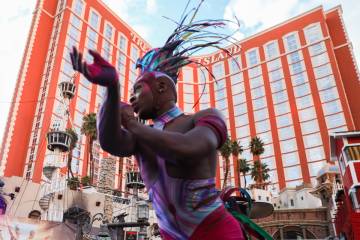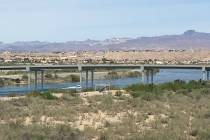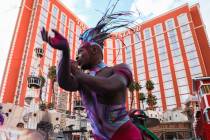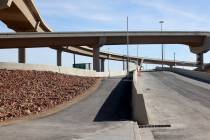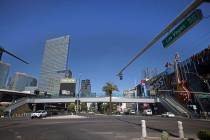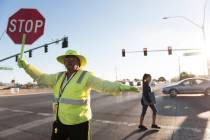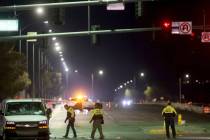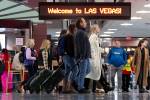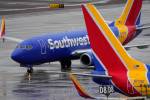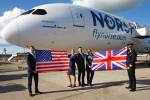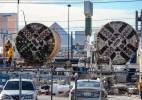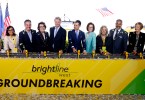Airport farewells are less emotional
Days after commercial flights were cleared to take to the air again after 9/11, my friend and I nervously boarded a flight to San Francisco.
McCarran International Airport was eerily silent. Passengers bellied up to the bar and said nothing.
We took our seats on the near-empty Southwest Airlines plane and scanned the cabin for anything strange, which was a challenge because everything seemed strange that day. Two younger guys caught our eye. They were wearing the same knit, reggae-style hat. Highly suspicious.
We shot each other a look and, without saying a word, moved forward to the aisle seats three rows back from the cockpit and one row in front of these men. It is unclear what crime two slightly buzzed women could thwart or, for that matter, what unprovoked crime two overly paranoid buzzed women could commit. All we were sure of was these guys would never make it to the cockpit. When the plane took off we peered back to see what nefarious acts they were plotting. They were sound asleep, suspicious hats pulled over their eyes.
Jitters of that amperage have since subsided, but air travel -- and subsequently airports -- have certainly undergone substantial changes.
Airports were once such emotional scenes. My earliest memories were leaving my father after summer vacation and desperately searching for him in the terminal from the plane for one last wave goodbye. And at the other end, the excitement of seeing my mother waiting for me at the gate.
Now it's a process and environment that feels more like a visit to the federally secured institution that it is.
Two months after the terrorist attacks, the federal government created the Transportation Security Administration, and a workforce of about 65,000 eventually was deployed to the nation's airports.
The security process was at first confusing. Passengers with carry-ons forgot about the new rules and officers and found their liquid medications, expensive colognes and seemingly harmless "weapons," such as tweezers, confiscated. We felt in the overall defense of our free country we were losing our freedom.
Stock values in companies like Ziploc soared as all travelers were directed to store toiletries in small, clear bags.
As fliers slowly adjusted to the new security procedures, others with sinister intentions drummed up more creative ways to sneak explosives onto aircraft. In response, the Department of Homeland Security, which oversees the TSA, implemented additional and more controversial measures.
Three months after the 9/11 attack, Richard Reid unsuccessfully attempted to bring down an airliner with a shoe bomb. That threat led to passengers having to remove their shoes before entering the airport's metal detectors.
Eight years later, Umar Farouk Abdulmutallab attempted to blow up a Christmas Day flight to Detroit with a bomb sewn into his underwear. That brought about full-body scanners and accompanying concerns that nude images of passengers was going a bit too far, even if they were seen in a backroom. It also raised concerns about the amount of radiation to which travelers must be exposed simply to travel by air.
Then came the physical pat-downs and nationally organized Opt-Out Day for those protesting the new scanners. Citizens across the country were outraged by stories of young children being "molested" by security teams or elderly people whose urostomy bags were broken, leaving urine on their clothing.
At the very moment four airliners were hijacked, our lives as travelers changed forever. The habit of arriving last-minute at an airport and sprinting O.J.-style through the terminal were over. So were the days of storing luggage in terminal lockers. No more hugs at the gates.
Airports also changed and not all for the worse. Because passengers had to arrive far earlier to leave enough time to make it through security, we saw a new trend: Airports began adding higher-end restaurants and more bars and other amenities that made layovers and long waits more comfortable.
It's difficult to remember how traveling was pre-9/11. This is the new normal. We have become accustomed to it. Younger folks might not remember the days passengers were asked whether they wanted a smoking or nonsmoking section of the plane. Generations to come will never remember a time when they weren't asked: "Scanner or pat-down?"
In hindsight, maybe we would have been far more fearful of the suspicious guys in funky hats days after 9/11 had we not known they too had gone through the more advanced security measures. Maybe we would have thought of "see something, say something," even though all there really was to say was "sweet dreams."
If you have a question, tip or tirade, call Adrienne Packer at 702-387-2904, or send an email to roadwarrior@reviewjournal.com. Include your phone number.
Starting at 7 tonight and lasting six weeks, repaving work on Interstate 15 will cause round-the-clock lane closures between Tropicana Avenue and the Spaghetti Bowl.
For two months, lane restrictions will be in effect 24 hours a day on Rainbow Boulevard. Rainbow will be reduced to one lane between Gowan Road and Red Coach Avenue while crews repave the street. Alternate routes include Tenaya Way and Rancho Drive.
For the next three weeks, expect delays on Ann Road between Durango Drive and Centennial Center Boulevard for resurfacing work.
For the next two weeks, the left lane of Interstate 15 south will be closed between Russell Road and Sunset Road. Lanes will shift to the right. The third lane from the left might continue southbound or exit onto the Las Vegas Beltway east. The fourth lane from the left can access only the Beltway east or west. The configuration will be in place 24 hours a day to accommodate work on express lanes.
For the next five months, the ramp from south Las Vegas Boulevard to northbound Interstate 15 will be closed 24 hours a day. Traffic will be detoured. Also, westbound Las Vegas Beltway traffic headed to northbound I-15 will be diverted to a temporary ramp about 1,500 feet west of the current ramp. The closures are to allow crews to work on bridges and walls in the area.
The Interstate 215 interchange at Fifth Street in North Las Vegas will be open to traffic at 9 a.m. Monday.
TRIATHLON ALERT: Delays are expected in Henderson today because of the Marine Corps Ironman World Championship 70.3 triathlon. The race starts at Lake Las Vegas, loops into the Lake Mead National Recreation Area and finishes at the Henderson Pavilion. Road closures and detours will be in effect from 6:30 a.m. until 6 p.m. A complete list of closures is available at hendersonlive.com/special-events/ironman.
GASOLINE PRICES
The average price of gasoline in the Las Vegas Valley on Friday was $3.63 per gallon; the current state average is $3.68; the national average is $3.67. Find the Las Vegas Valley's best deals at gasbuddy.com.
LAS VEGAS REVIEW-JOURNAL






